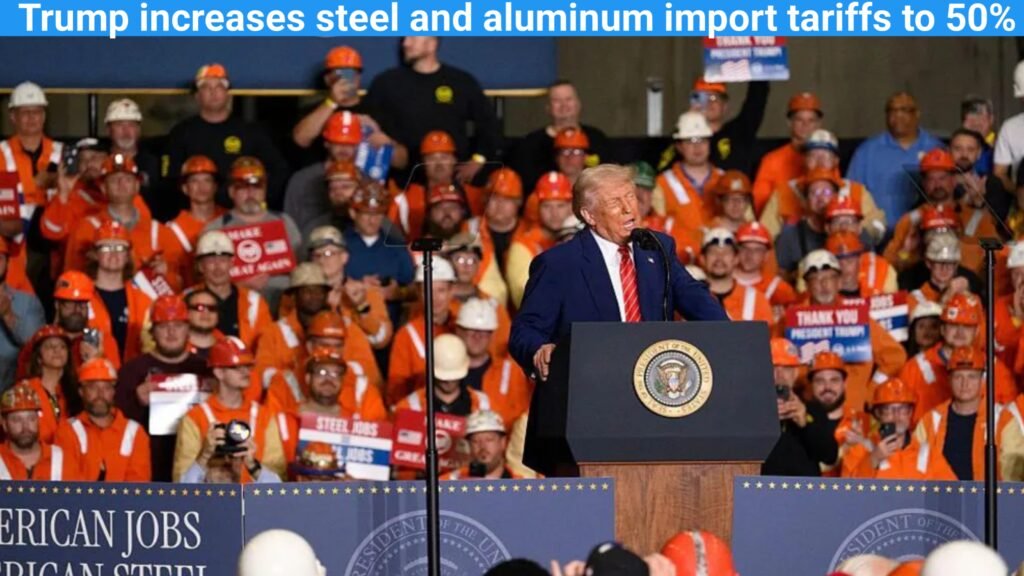
President Donald Trump has revealed that the United States will raise tariffs on steel and aluminum imports from 25% to 50%, with the change taking effect on Wednesday.
During a rally in Pittsburgh, Pennsylvania, Trump said the increased tariffs are aimed at strengthening the domestic steel industry and reducing dependence on Chinese imports.
He also announced a planned \$14 billion investment in the region’s steel sector, involving a collaboration between US Steel and Japan’s Nippon Steel. However, specifics of the partnership remain unclear, and neither company has officially confirmed the agreement.
This announcement marks the latest shift in Trump’s fluctuating tariff strategy since his return to office in January.
“There will be no job cuts or outsourcing at all, and every American steelworker will soon receive a well-earned \$5,000 bonus,” President Trump declared to loud applause from a crowd packed with steelworkers.
One of the key concerns raised by workers about the US-Japan trade agreement has been whether Japan will respect existing union contracts that govern wages and hiring practices.
Trump opened his speech by recalling how he “saved” US Steel — the nation’s largest steel producer, based in Pittsburgh — with the 25% tariffs he introduced during his first presidential term in 2018.
He promoted the new 50% tariff hike as essential to keeping US Steel afloat.
“At 50%, they won’t be able to climb over the wall,” he said. “We’re going to make Pennsylvania steel the backbone of America once again — stronger than ever before.
”The announcement comes as legal challenges over the broader scope of Trump’s global tariffs continue to play out in court. An appeals court recently allowed the case to proceed after a lower court ruled to block the taxes. However, the tariffs on steel and aluminum remain unaffected by the lawsuit.
Mr. Burgess, who also serves as the mayor of Washington, Pennsylvania, welcomed the reported details of the potential partnership with Japan’s Nippon Steel, expressing hope that it would help inspire a new generation of steelworkers in the region.
He reminisced about earning a good income after Trump’s initial steel tariffs were introduced during his first term.
Although Burgess doesn’t consider himself a Trump supporter—having voted exclusively for Democratic presidential candidates over the past 20 years—he stated, “I’m not going to oppose anything that helps level the playing field for American manufacturing.
”Despite such optimism, the broader consequences of Trump’s tariff policies have been turbulent. His trade actions have disrupted global markets, strained international trade, and deepened divisions between the US and several of its key allies.
The tariffs significantly damaged the already-tense relationship between the US and China, the world’s two largest economies, escalating into a retaliatory trade war.
On Friday, Trump accused China of breaking a recently negotiated tariff truce agreed upon during talks in Geneva earlier in the month. “China completely broke its deal with us,” Trump claimed, though he offered no specifics. Later, US Trade Representative Jamieson Greer clarified that China had failed to remove non-tariff trade barriers as promised.
In response, China dismissed the accusations but urged the US to stop what it called “discriminatory restrictions” against Chinese firms.
China remains the world’s top steel producer, accounting for more than half of global output as of 2022, according to the World Steel Association. The US has fallen to fourth place, behind China, India, and Japan.“If you don’t have steel, you don’t have a country. And without a country, you can’t build a military,” Trump told the Pittsburgh rally crowd. “What are we going to do—go to China for steel to make our tanks?” he joked.
During his hour-long rally, Trump alluded to the proposed deal with Nippon Steel but did not provide further specifics. Both US Steel and Nippon Steel have yet to confirm the agreement.On the campaign trail, Trump had vowed to block any foreign takeover of US Steel, the iconic 124-year-old American steelmaker. How the reported partnership would work, and who would ultimately control the company, remains unclear.
White House officials claimed Trump had secured a commitment from Nippon Steel to significantly expand investment in US operations and to give the US government a strong role in overseeing those activities.
Reports suggest that Japan plans to invest \$14 billion over 14 months. Other reported terms include maintaining American ownership of US Steel assets, placing US citizens in executive and board positions, preserving production levels for at least 10 years, and giving the US government veto power over production cuts after that period.
CREDIT : BBC news


